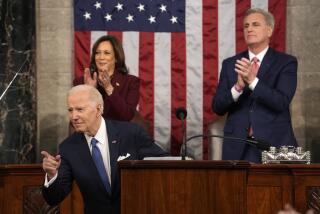Nationalism Runs Afoul of the Corporate Mentality : Geopolitics: Workers are bound to the place where they live, and value a sense of defined community.
- Share via
President Bush has had a blind spot when it comes to understanding the powerful democratic impulse represented by the rising tide of democratic nationalism among Russians, Balts, Ukrainians, Armenians and other peoples in the Soviet Union. Indeed, far from embracing such democratic forces, there is ample evidence that President Bush regards nationalism and separatism as impulses that are suicidal, dangerous to stability or impediments to the wheels of commerce.
Whether pressing to maintain a common economic and political space in the Soviet Union or working to erase trade boundaries between the United States and Mexico or Canada, the President actively promotes the post-nationalist new world order.
What accounts for this policy? In large measure it derives from the President’s roots in the corporate boardroom. For contrary to Marx, it is not workers who are bearers of the internationalist impulse, but the modern-day corporation.
While corporations transfer hundreds of millions of dollars across oceans in a computer’s milliseconds, workers are bound to the place where they live. Workers cannot easily transcend attachments to family, faith, language, community and culture.
National borders may be coming down for those in the boardrooms, but they are the reality of daily life for the average worker. Standing Marx on his head--in the Ukraine as in Russia, in Lithuania as in Slovenia and in the United States itself--working people form the bedrock of patriotic sentiment and the fertile soil on which democratic nationalism flourishes.
Today economic and political elites weaken the prerogatives of nation-states. But such attitudes will never diminish the need of people to feel a sense of autonomy and sovereignty within a defined community. The erosion of national sovereignty makes all of us more marginal participants in an ever-growing political space.
Can President Bush abandon the anti-nationalist leitmotif of his foreign policy? If he draws the right lesson from the events of recent days:
-- He will see the power of the national idea that led resistance to the coup in Russia and other republics.
-- He will see that the best way to ensure the defeat of the forces of militarism is by assisting democratic nationalist forces in their efforts to dismantle the powerful central Soviet government.
-- He will quickly recognize the independence of Lithuania, Latvia and Estonia (something Russian President Boris Yeltsin has already done).
-- He will support economic aid targeted to democratically elected governments in the republics and promote democracy-building aid to movements in republics where communists are still in control.
-- He will begin to develop diplomatic and economic relationships with the new democratic states that are emerging on the ashes of the failed empire.
More to Read
Get the L.A. Times Politics newsletter
Deeply reported insights into legislation, politics and policy from Sacramento, Washington and beyond. In your inbox twice per week.
You may occasionally receive promotional content from the Los Angeles Times.










